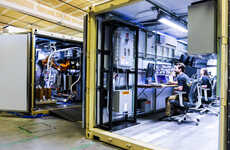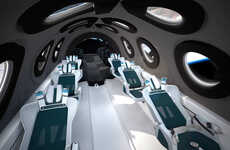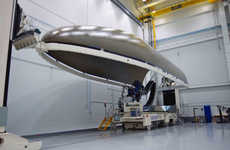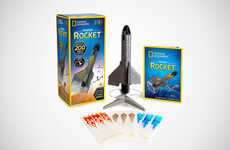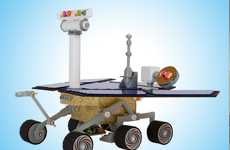
The Starscraper is a Cheap and Reusable Suborbital Rocket
Rahul Kalvapalle — January 7, 2015 — Tech
References: burocket.org & gizmag
The Boston University Rocket Propulsion Group, comprising undergraduate engineering students at Boston University, is bidding to develop an inexpensive suborbital rocket called the Starscraper -- targeted towards educational use -- that is inexpensive and reusable. The rocket aims to address the problems surrounding the exorbitant cost of sub-orbital rockets, which cost around $1 million per launch.
The Starscraper measures 9 meters long and weighs 499 kg, and is designed to be able to lift a 45-kg payload to an altitude of 133,000 meters before returning it safely back to Earth.
The student researchers have currently spent $90,000 on developing and testing the Starscraper, and are looking to raise funds through a Kickstarter campaign. Depending on pledge level, backers will be rewarded with perks like prints and photos to an invitation to the launch in 2015.
The Starscraper measures 9 meters long and weighs 499 kg, and is designed to be able to lift a 45-kg payload to an altitude of 133,000 meters before returning it safely back to Earth.
The student researchers have currently spent $90,000 on developing and testing the Starscraper, and are looking to raise funds through a Kickstarter campaign. Depending on pledge level, backers will be rewarded with perks like prints and photos to an invitation to the launch in 2015.
Trend Themes
1. Reusable Rockets - With the increasing demand for space exploration, reusable rockets have potential in disrupting the aerospace industry regarding launch costs.
2. Educational Rockets - Developing affordable rockets that are targeted towards educational use can disrupt the academic sector by making space exploration more accessible.
3. Crowdfunding for Aerospace Research - Using crowdfunding platforms like Kickstarter for financing space exploration can potentially disrupt the traditional methods of funding aerospace research.
Industry Implications
1. Aerospace - The aerospace industry can benefit significantly from reusable rockets as it reduces the high launch costs associated with space exploration.
2. Education - Developing affordable and accessible educational rockets can revolutionize the academic sector by allowing more students and researchers to participate in space exploration.
3. Crowdfunding - Using crowdfunding to finance space exploration can revolutionize traditional methods of funding aerospace research, opening up opportunities for more projects and experimentation.
1.1
Score
Popularity
Activity
Freshness


